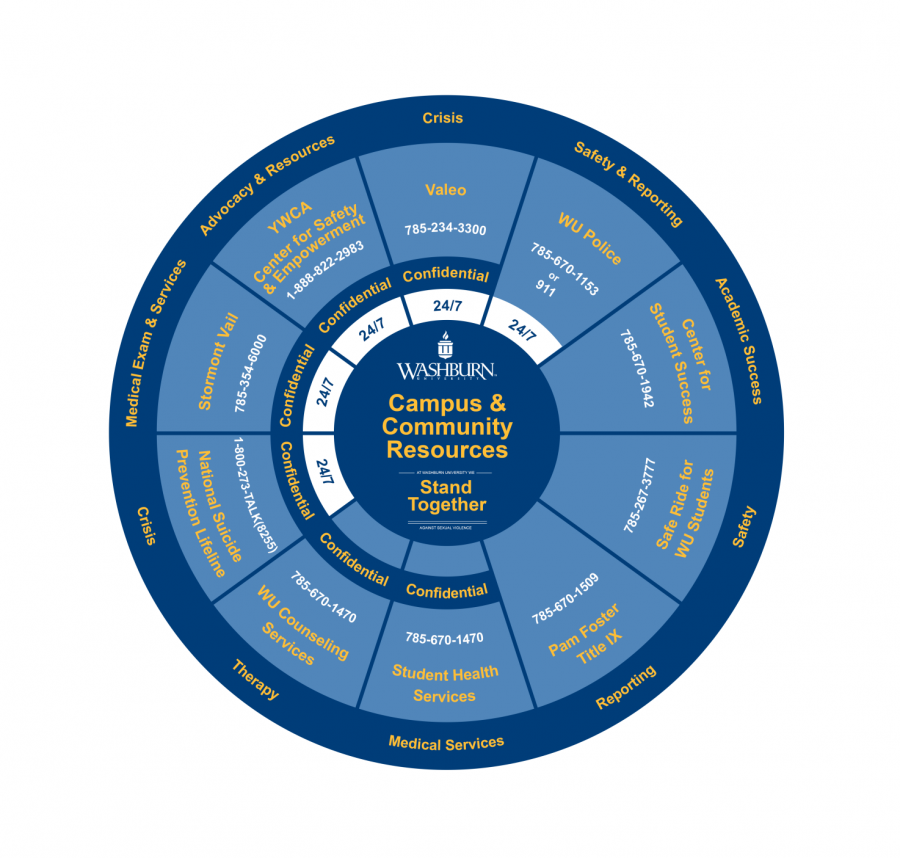Policy change fosters safer campus
August 26, 2015
With campus wide Title IX changes, Washburn hopes to improve its system of reporting sexual harassment and sexual violence, while ensuring that students are protected against discrimination based on gender.
With the start of the fall semester, professors were required to inform their students of a policy change in regards to Title IX’s implementation on Washburn’s campus. The revised changes became official policy on July 23, 2015. These changes in policy are intended to better the investigation of complaints filed in relation to sex discrimination and to ensure the safety and protection of students, faculty and staff.
Title IX is a landmark civil right included in the Education Amendments of 1972, as the law prohibits discrimination on the basis of sex in education programs.
Pamela Foster is Washburn University’s Equal Opportunity coordinator, Title IX coordinator, and Americans with Disabilities Act (ADA) coordinator. Foster works alongside human resources and the vice president of academic affairs, overseeing hiring processes and advertising and ensuring that all personnel are being given equal opportunities.
“I work with discrimination, harassment, sexual harassment, and sexual violence complaints to ensure that there is no discrimination based on sex,” Foster said.
While Title IX is most often associated with athletics, according to Foster, the policy has always been about eliminating discrimination in any educational program against a person based on sex.
In addition to its application to athletics, Title IX protects any and all persons regardless of sex and covers gender-based discrimination, including sexual harassment and sexual violence.
According Washburn University Policies and Procedures, sexual harassment, a form of sex discrimination, is “sexual in nature, is unwelcome and denies or limits an individual’s ability to participate in or to benefit from a privilege of that individual’s employment, education or on-campus living environment.”
There is no limit for when a sexual assault or offense complaint can be filed. However, you must file a discriminatory complaint within 180 days. Even if the incident occurred two years ago, an investigation will still be conducted if the respondent, or alleged violator, is still on campus.
If a student believes their rights have been violated, they can find more information on filing a complaint through Washburn’s website. Washburn’s resources are located at washburn.edu, under a link titled “prohibits discrimination.” The Office for Civil Rights (OCR) states that all resources need to be found within two clicks of the university’s homepage.
“When you need this information, the resources need to be readily available and quickly accessible,” said Chris Enos, captain of the Washburn University Police Department.
The webpage features many resources for those wishing to file a complaint; including how to file a complaint. One can fill out an online form in a secure server, call (785) 670-1509, visit Pam Foster in Morgan Hall 200K, or print off and complete the form.
After a complaint is filed, the university will conduct an investigation to examine whether or not there was a policy violation. The police department will only become involved if the incident consists of a criminal offense or violence.
A few changes within the Title IX policy were the addition of a definition for the term consent and an outlined complaint process that is easier for universities to execute. The policy increased from approximately five pages to 20 pages in length due to the addition of details.
“The changes mean everyone – universities, coordinators and everyone involved in related cases – will be held accountable so that the end goal of a more equal educational experience can be had for all,” said Connor England, junior economics and entrepreneurship double major.
Chloe Mooradian, junior history major, respects the university’s continuing effort to prevent future incidents by reforming the way reported issues are handled.
“Our time here at the university should be a time of growth and maturity and development of critical thinking, not a time where one isn’t able to grow to their full potential because of fears, pressures and abuse,” Mooradian said.
Without filing a complaint, students still have access to campus resources like counseling and student health services where their personal situation will remain confidential.
“My job as the counseling role is to help people heal and process through it and charges can be a part of that process or not,” said Jamie Olsen, director of counseling services. “Some people are ready to file right away while with others it may take six months or a year.”
Olsen collaborated with Foster to create the resource wheel, a circular design seen at Kansas State University that includes important information for students. The wheel includes phone numbers for WU police, WU counseling services, Stormont Vail, National Suicide Prevention Lifeline, among others.
The resource wheels will be displayed in on-campus residence halls and other areas on campus to reach a wide array of Washburn personnel.
Foster, along with counseling services and WUPD, have been working hard to further their efforts to create an environment of compassion and security.
“Students need to know that they can come and talk to us. They aren’t a bother and we’re happy and want to talk to them,” Foster said.
In regards to the Title IX changes in policy, the Strategic Analysis and Reporting office will issue an anonymous campus survey about the Washburn climate in regards to sexual assault reporting at the beginning of October.



